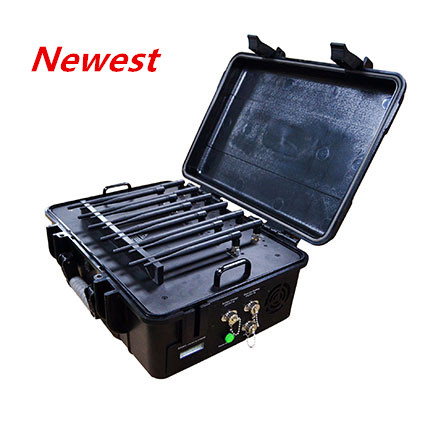Johannesburg - A signal jammer that was used to break cell phone communications in Parliament was too small to encrypt reception on an airplane or to block the signal frequency over 100 meters.
This emerges from the point of view of a Joburg high-risk security expert who specializes in the international delivery of jamming devices to places like Afghanistan, where the devices are used to combat the remote-controlled explosion of bombs.
The expert, who wanted to remain anonymous and runs his business east of Joburg, said it needed a "powerful signal jammer" to block aircraft communications.
"The device used in parliament was a 120 to 150 watt (jammer) that could cover up to 150 m of frequency blocking.

"In order to enforce a no-fly zone, a high power jammer would have to be used.
"Which plane would fly deeper than 100 m? That jammer would not drop a plane flying over Parliament."
This week, State Security Secretary David Mahlobo said the signal disruption was an operational error caused by a member on duty.
Those on duty were members of the State Security Agency.
"The operator was unable to terminate the device properly, which affected some mobile phone users," said the minister.
"An investigation into the department with the possibility of disciplinary action against those responsible is underway."
Mahlobo said it was on behalf of the State Security Bureau to take such action at major events attended by the president and his deputy and where the threat and risk assessment warranted it.
"This operation should never frustrate MPs, the media or anyone who visited Parliament. The result of the device not being properly turned off will be displayed."
The expert said jammers can be built into VIP motorcades if they are to counter threats. There are many better ways that one could have addressed possible threats in Parliament.
"It is clear to me that the State Security Agency knew what was coming," he said.
"Their response to the EFF was planned, and the jammer they used could only emit cellphone signals to counter a potential local threat. It was too public to jam."
However, the high-risk security chief also revealed that signal interference, even when not used by authorized state security agencies, is "common" at government meetings and in private businesses. In order to superimpose incoming signals, a jammer only needs to generate around 2 W.
The expert said he frequently receives inquiries from provincial government departments to purchase signal jamming devices for high-level meetings in boardrooms.
"Politicians always use jammers to block cell phone communications in meetings so that no one can call or record what is being discussed," he said.
"It happens every day. The only reason people are outraged now is that this one went broke.
"Jammers interrupt signals in an area. If a phone tries to connect to a tower, it cannot because the frequency is blocked by other noise."
According to the expert, signal jammers appear in private companies to "improve productivity in manufacturing and combat corporate espionage".
Although illegal in South Africa, a search for the term "cell phone or signal jamming" on the Internet has produced dozens of websites.
Most of them were news reports about devices and websites that listed the specifications of the jammers for sale.
Many, including hand-jammers, are offered on a handful of websites. Police have found money truck robbers and truck hijacking syndicates using GPS jammers to aid their escape routes.
"As with any other product, in my opinion the advantages far outweigh the disadvantages," said the expert.
"However, they are obviously illegal to sell or use in South Africa, which is why we only sell them to international buyers."




